
News Topical, Digital Desk : Kidney Transplant Information: Kidney transplant is a very risky job, but it saves lives. When a person's kidneys stop functioning properly and the body doesn't get proper relief even with the help of dialysis, then the doctor recommends kidney transplant. In such a situation, the question that definitely arises in the mind is that the new kidney is implanted in the body, but what happens to the patient's old, damaged kidney? This is the question that keeps people wondering the most. Let us tell you what happens to the old kidney.
What happens to old kidneys?
According to Nyulangone's report, in most cases, doctors leave the old kidneys in the body. In fact, even though a damaged kidney isn't functioning properly, it doesn't cause any harm to the body. Therefore, it doesn't need to be removed during surgery. In medical terms, it's called a "non-functional kidney," which can remain in the body without causing any problems. Furthermore, it gets smaller over time. People often assume that the old kidney will be removed and replaced with a new one. However, the reality is quite the opposite. Doctors place the new kidney in the lower abdomen, where it's easier to connect to the blood supply and bladder. This means that most patients have three kidneys after the transplant: two old and one new.
When is the kidney removed?
However, in some cases, the kidney may be removed, such as if the old kidney is constantly infected. Also, if the kidney has become too large and is causing abdominal swelling or pain. If a kidney disease, such as cancer, is detected, it may be removed. In such cases, doctors remove the old kidney before or along with the transplant. Although the old kidney remains in place, the new kidney takes over all functions, such as filtering blood, producing urine, and removing toxins from the body. Although the old kidney remains in place, it no longer plays a role in our lives.
Read More: Poor sleep and obesity are contributing factors to breast cancer! ICMR issues this warning to women
--Advertisement--

 Share
Share



